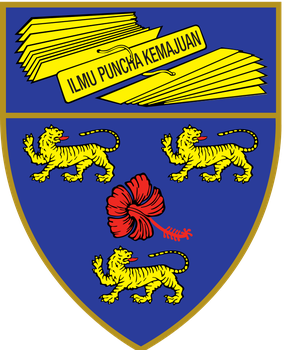
Kuala Lumpur, officially the Federal Territory of Kuala Lumpur and colloquially referred to as KL, is a federal territory and the capital city of Malaysia. It is one of the fastest-growing cities in Asia and the largest city in Malaysia, covering an area of 243 km2 (94 sq mi) with a census population of 1,982,112 as of 2020. Greater Kuala Lumpur, also known as the Klang Valley, is an urban agglomeration of 7.564 million people as of 2018. It is among the fastest growing metropolitan regions in Southeast Asia, both in population and economic development.

The University of Malaya is a public research university located in Kuala Lumpur, Malaysia. It is the oldest and highest ranking Malaysian institution of higher education, and was the only university in newly independent Malaya. The university has graduated five prime ministers of Malaysia, and other political, business, and cultural figures of national prominence.

The National University of Malaysia is a public research university located in Bandar Baru Bangi, Hulu Langat District, Selangor, Malaysia. Its teaching hospital, Universiti Kebangsaan Malaysia Medical Centre (UKMMC) is located in Cheras and also has a branch campus in Kuala Lumpur.

This article lists important figures and events in Malayan and Malaysian public affairs during the year 1963, together with births and deaths of significant Malaysians. The Federation of Malaya merged with Singapore, North Borneo, and Sarawak to form the Federation of Malaysia on 16 September.
Dato' Sir Ernest Emmanuel Clough Thuraisingham or E.E.C. Thuraisingham was the first local Member (Minister) for Education in the Communities Liaison Committee formed to build communal fraternity in British-ruled Malaya, from 1951–1955. He is also the first Asian chairman of the Selangor Turf Club.
Dr. M. K. Rajakumar was a Malaysian doctor and socialist politician. As a doctor, he was a pioneer of the discipline of Family Medicine by general practitioners in Malaysia. As a leftist intellectual he was among the leaders of the Labour Party of Malaya and Barisan Sosialis in the 1960s, helping to build the Labour Party alongside Tan Chee Khoon, V. David and Ishak Haji Muhammad.
Kapitan China Yap Ah Shak of Petaling served as the fourth and penultimate Kapitan China of nineteenth-century Kuala Lumpur. He was a wealthy Huizhou Hakka merchant and a Hai San leader.
Khadijah Hashim is a Malaysian writer, teacher and journalist. She has worked as a teacher and also as a journalist with local newspapers Utusan Melayu (1974–1976) and Berita Harian (1976–1985). She is better known as a novelist, and has produced 19 novels. She also expanded her creativity in the field of short stories, radio drama scripts, children's books, rhymes and poetry. The children's rhyme book "Sayang Sayang" has been selected to be on Honour List of the International Board on Books for Young People (IBBY) in Basel, Switzerland (2002) and "Semerbak Poetry" in Macau, China (2006). Khadijah continues her interests in writing rhymes, which led to her latest creation of "Putera-puteri Malaysia".

Malaysian Sikhs are known to be the fourth largest Malaysian Indian ethnic group. It is estimated that there are around 100,000 Sikhs in Malaysia.
Prof. Datuk Dr. Thirunavuk Arasu Sinnathuray, better known as T.A. Sinnathuray, was a Malaysian obstetrician and gynaecologist. He was the first Malaysian doctor to possess both the diplomas of MRCOG and the FRCS.
The Yong Loo Lin School of Medicine, established in 1905, is the first institution of higher learning in Singapore and the genesis of the National University of Singapore. The School is one of many who offer medical programmes in the Asia Pacific region. The Times Higher Education World University Rankings 2019 by subject and Quacquarelli Symonds (QS) World University Rankings by Subject 2019 list NUS Medicine as the leading medical school in Asia. Its distinguished alumni include cabinet ministers of Singapore, well-known doctors and a Prime Minister of Malaysia and father of the president-elect of Singapore.

The Faculty of Medicine, University of Malaya is one of the thirteen faculties of the University of Malaya (UM). It was officially established in September 1962 after the establishment of the university's Kuala Lumpur campus. This was the first medical school established in Malaysia.

Brunei–Turkey relations are the bilateral relations between Brunei and Turkey. Turkey has an embassy in Bandar Seri Begawan since October 15, 2013. Brunei opened its embassy in Ankara on January 8, 2014.
Anarchism in Malaysia arose from the revolutionary activities of Chinese immigrants in British Malaya, who were the first to construct an organized anarchist movement in the country - reaching its peak during the 1920s. After a campaign of repression by the British authorities, anarchism was supplanted by Bolshevism as the leading revolutionary current, until the resurgence of the anarchist movement during the 1980s, as part of the Malaysian punk scene.







